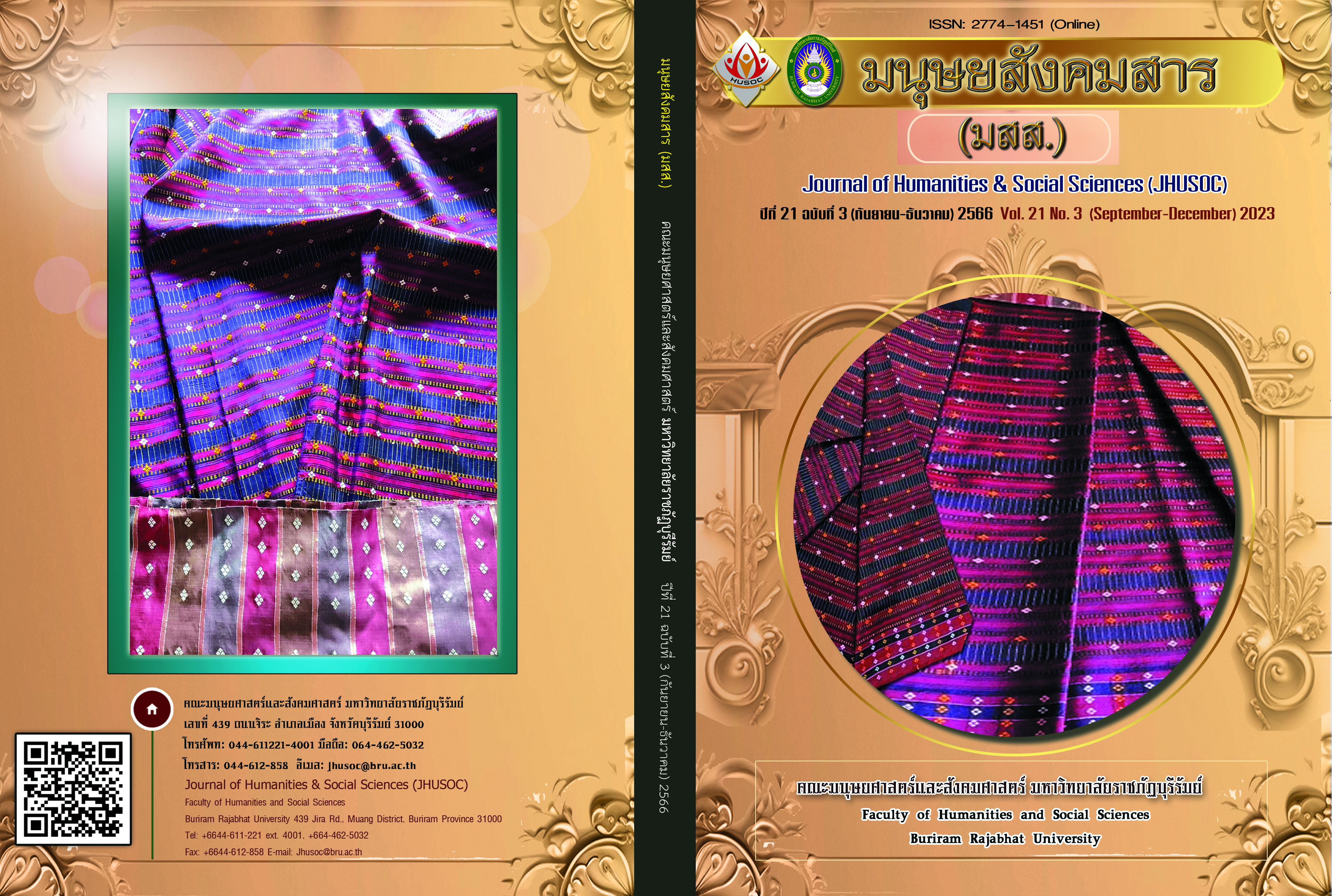Cluster Analysis to Compare Learner Characteristics in English Courses of General Education
Main Article Content
บทคัดย่อ
Understanding learner characteristics can guide educators in providing appropriate support to meet individual needs which can lead to learning achievement. This research aimed: 1) to cluster students by grades earned from English courses of General Education (GE) at a government university using cluster analysis, and 2) to compare the learner characteristics across different achievement levels by focusing on four learner characteristics, i.e. (1) motivation and attitudes, (2) student engagement, (3) test preparation and test taking behaviours, and (4) Classroom participation. A sample of 400 individuals was derived through cluster sampling. The research instrument was a questionnaire. The data were statistically analyzed by using frequency, mean, standard deviation, K-means cluster analysis, MANOVA, ANOVA, and Bonferroni. The findings were as follows. 1) Using K-means cluster analysis to cluster student achievement levels as indicated by grade point averages of the two GE English courses, it found three clusters: high achievers, moderate achievers, and low achievers. 2) Concerning comparisons of learner characteristics, it found that motivation and attitudes, learning engagement, and test preparation and test taking behaviours of the high achievers were significantly higher than those of the moderate and low ones. However, it found no statistically significant difference between the learner characteristics of the moderate achievers and those of the low ones. Remarkably, statistically significant differences in classroom participation of all the three clusters were not found.
Article Details

อนุญาตภายใต้เงื่อนไข Creative Commons Attribution-NonCommercial 4.0 International License.
เนื้อหาและข้อมูลในบทความที่ลงตีพิมพ์ในวารสารทดสอบระบบ ThaiJo2 ถือเป็นข้อคิดเห็นและความรับผิดชอบของผู้เขียนบทความโดยตรงซึ่งกองบรรณาธิการวารสาร ไม่จำเป็นต้องเห็นด้วย หรือร่วมรับผิดชอบใดๆ
บทความ ข้อมูล เนื้อหา รูปภาพ ฯลฯ ที่ได้รับการตีพิมพ์ในวารสารทดสอบระบบ ThaiJo2 ถือเป็นลิขสิทธิ์ของวารสารทดสอบระบบ ThaiJo2 หากบุคคลหรือหน่วยงานใดต้องการนำทั้งหมดหรือส่วนหนึ่งส่วนใดไปเผยแพร่ต่อหรือเพื่อกระทำการใดๆ จะต้องได้รับอนุญาตเป็นลายลักอักษรจากวารสารทดสอบระบบ ThaiJo2 ก่อนเท่านั้น
เอกสารอ้างอิง
Arkhipova, M. V., Belova, E. E., & Shutova, B. N. (2017). On motivation of learning as English as a foreign language: Research experience in Russian university context. In A. Filchenko, & Z. Anikina (Series Eds.), Linguistic and Cultural Studies: Traditions and Innovations: Vol 677. Advances in Intelligent Systems and Computing, 113-121. http://doi.org/10.1007/978-3-319-67843-6_14
Astin, A. W. (1999). Student involvement: A developmental theory for higher education. Journal of College Student Development, 40(5), 297-308.
Berliner, D. C. (1990). What’s all the fuss about instructional time? In M. Ben-Peretz, & R. Bromme (Eds.), The nature of time in schools: Theoretical concepts, practitioner perceptions, 3-35. Teachers College Press.
Best, J. W. (1997). Research in education. Englewood Cliffs. Prentice-Hall.
Bleidorn, W. (2012). Hitting the road to adulthood: Short-term personality development during a major life transition. Personality and Social Psychology Bulletin, 20(10), 1–15. 113-121. http://doi.org/10.1177/0146167212456707
Broekkamp, H., & Hout-Wolters, B. (2006). Students’ adaptation of study strategies when preparing for classroom tests. Educational Psychology Review. 19(4). 401- 428. 113-121. http://doi.org/10.1007/s10648-006-9025-0
Cooper, J., & Robinson, P. (2002). The argument for making large classes seem small. New Directions for Teaching and Learning, 2000(81), 5-16. http://doi.org/10.1002/tl.20504
Dancer, D., & Kamvounias, P. (2005). Student involvement in assessment: A project designed to assess class participation fairly and reliably. Assessment & Evaluation in Higher Education, 30(4), 445-454.
De Koning, B. B., Loyens, S. M. M., Rikers, R. M. J. P., Smeets, G., & Molen, H. T. (2012). Generation Psy: Student characteristics and academic achievement in a three-year problem-based learning bachelor program. Learning and Individual Differences, 22(3), 313-323.
Drachsler, H., & Kirschner, P. A. (2011). Learner characteristics. In N. M. Seel, (Ed.), Encyclopedia of the Sciences of Learning. Springer. http://doi.org/10.1007/978-1-4419-1428-6_347
Ellis, R. (1995). Understanding second language acquisition. Oxford University Press.
Fritschner, L. M. (2000). Inside the undergraduate college classroom: Faculty and students differ on the meaning of student participation. The Journal of Higher Education, 71(3), 342-362. http://doi.org/10.2307/2649294
Gardner, R. C. (1985). Social psychology and second language learning: The role of attitudes and motivation. Edward Arnold.
Hedge, T. (2000). Teaching and learning in the language classroom. Oxford University Press.
Kim, A. S. N., Shakory, S., Azad, A., Popovic, C., & Park, L. (2019). Understanding the impact of attendance and participation on academic achievement. Scholarship of Teaching and Learning in Psychology, 6(4), 272-284. http://doi.org/10.1037/stl0000151
Kirsch, I., Jong, J., LaFontaine, D., McQueen, J., Mendelovits, J., & Monseur, C. (2002). Reading for change: Performance and engagement across countries result from PISA 2000. Organization for Economic Co-operation and Development.
Kitsantas, A. (2002). Test preparation and performance: A self-regulatory analysis. The Journal of Experimental Education, 70(2), 101–113. http://doi.org/10.1080/00220970209599501
Kuh, G. D. (2009). What student affairs professionals need to know about student engagement. Journal of College Student Development, 50(6), 683–706. http://doi.org/10.1353/csd.0.0099
Skinner, E. A., & Pitzer, J. R. (2012). Developmental dynamics of student engagement, coping, and everyday resilience. In S. L. Christenson, A. L. Reschly & C. Wylie (Eds.), Handbook of research on student engagement, 21-44. Springer.
Tatar, S. (2005). Why keep silent? The classroom participation experiences of non-native-English-speaking students. Language and Intercultural Communication, 5(3-4), 284-293.
Thang, S. M., Ting, M., & Jaafar, N. M. (2011). Attitudes and motivation of Malaysian Secondary students towards learning English as a second language: A case study. 3L: The Southeast Asian Journal of English Language Studies, 17(1), 40-54.
Trowler, V. (2010). Student engagement literature review. The Higher Education Academy. https://www.advance-he.ac.uk/knowledge-hub/student-engagement-literature-review
Vandrick, S. (2000). Language, culture, class, gender and class participation. Paper presented at TESOL Annual International Convention, Vancouver, Canada. https://eric.ed.gov/?id=ED473086


